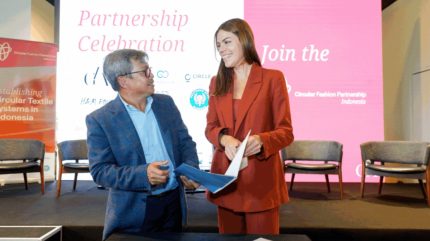
Global Fashion Agenda is working with Indonesia’s Sustainable Textile Chain (Rantai Tekstil Lestari – RTL) on the project and it is being supported by implementation partners Reverse Resources, Closed Loop Fashion, and Circle Economy Foundation. Plus, it is being funded by H&M Foundation and private sector contributions.
It pointed out the organisations are keen for a broader participation from brands, manufacturers, waste handlers, recyclers, and government bodies to participate in the collective action programme to achieve impact at scale.
Global Fashion Agenda CEO Federica Marchionni said: “Since 2018, Denmark and Indonesia have been in strategic collaboration to support a circular economy and more effective waste management. By working with key local stakeholders, we believe that there is great potential in scaling recycling solutions in Indonesia and hope to collaborate with a wide ecosystem of actors in the region to tailor programmes to the unique local context and, in turn, support the transition to a circular economy.”
The project national lead RTL will ensure the programme is appropriately tailored to the local context and includes and benefits all necessary local stakeholders, aligns with the government’s strategy, and connects with the right ministries to bridge the identified policy gaps.
RTL chair Basrie Kamba admitted it won’t be easy. He said: “We’re not aiming for something that is impractical here. But this partnership will also enhance the understanding of circular economy ecosystems that can guide local and national government officials, manufacturers, practitioners, academics, media and consumers in pursuing circular economy in the ecosystems setting.”
The Circular Fashion Partnership Indonesia hopes to develop effective circular fashion systems by capturing and recycling post-industrial textile waste. It believes that by increasing the availability of recycled materials, it can reduce the use of virgin resources.
The project will involve working groups and training sessions that will bring global brands, local manufacturers, waste handlers, recyclers, and knowledge institutes together. The collaboration seeks to promote best practices, enable participants to educate other industry stakeholders on the principles of the circular economy and drive the adoption of sustainable practices across Indonesia’s fashion industry.
Over 100 leading experts and stakeholders attended the launch event to discuss best practices for managing textile waste, ensuring traceability and the scaling of domestic recycling capabilities.
The project is part of the Global Circular Fashion Forum (GCFF), which promotes global and local actions to scale recycling of post-industrial textile waste in multiple manufacturing countries including Bangladesh, Cambodia, and Vietnam.
It will build on the success of a similar project in Bangladesh, which started in 2020 and currently includes Unido’s Bestseller Switch to Upstream Circularity pilot programme.
In Bangladesh, over 80 factories were trained to segregate textile waste within their facilities and digitally trace these material flows to recycling solutions.
By July 2024 the Reverse Resources platform had enabled the tracing of over 21,000 tonnes of waste (equivalent to approximately 116m tshirts), saving an estimated 140062 tonnes of CO2 emissions. Plus, seven global brands and 77 manufacturers had committed to recycling efforts with 28 recyclers taking part.
Global Fashion Agenda explained that it plans to leverage what it has learned from the Bangladesh project and will adapt it to the unique characteristics and nuanced local context of the Indonesian sector.
It aims to replicate and grow its achievements to establish a prosperous circular textile economy.
The non-profit added that Indonesia with its advanced vertical supply chain and substantial recyclable feedstock is poised to become a leader in textile recycling and Reverse Resources estimates that 874 kilotonnes of recyclable textile waste will be generated annually in Indonesia.
Plus, it shared that Indonesia’s policy environment provides a conducive framework for promoting circular apparel manufacturing through its Roadmap to 2050.



